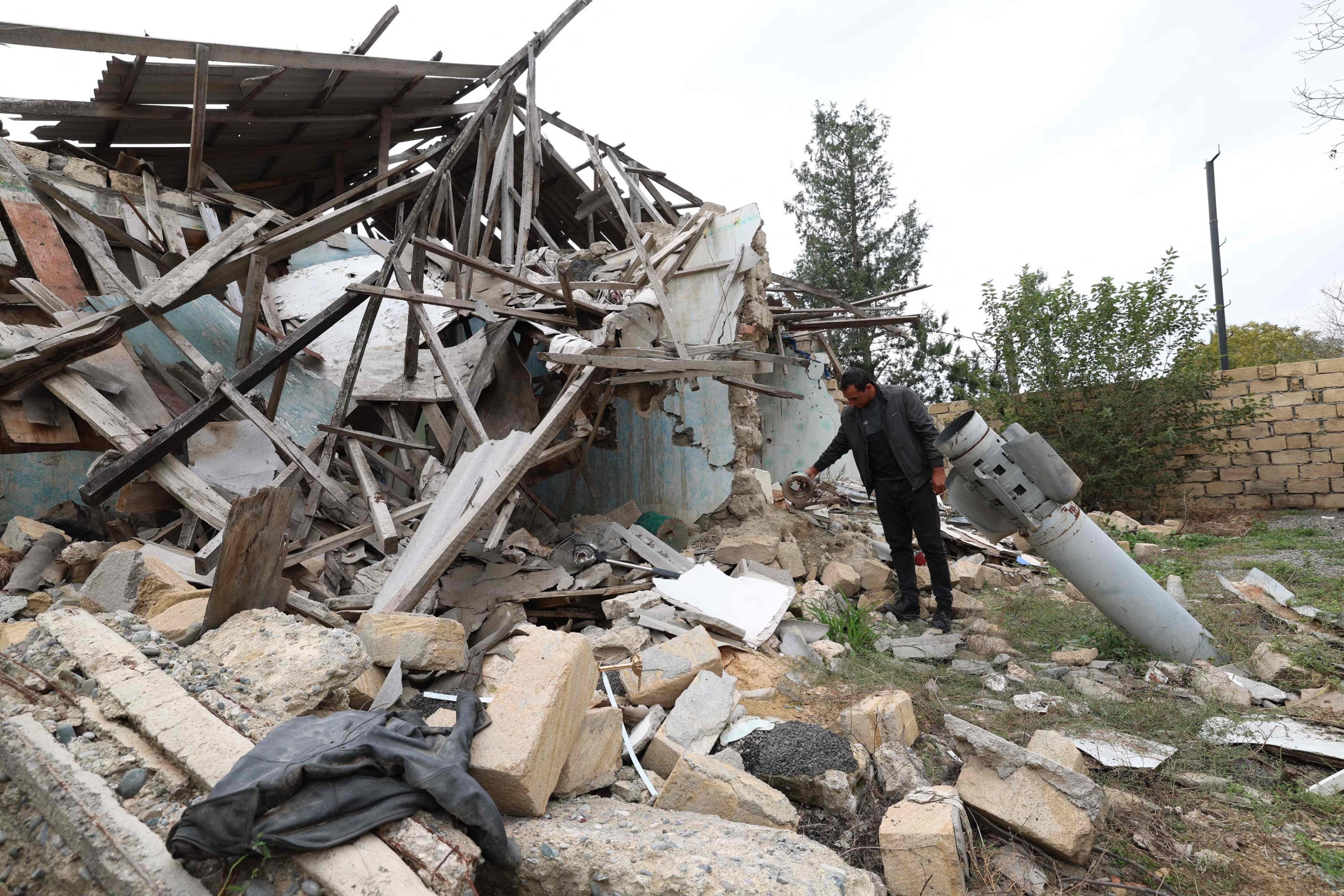© Turkuvaz Haberleşme ve Yayıncılık 2024
Azerbaijan disclosed the number of casualties in another offensive in its Karabakh region on Memorial Day, observed on Wednesday to honor the fallen soldiers in the 2020 Karabakh war.
The government gave the number of soldiers killed in the counterterrorism operation on Sept. 19-20 in Karabakh as 192. It reported that another 511 soldiers were injured. It said one civilian was killed and another was killed by Armenian gunfire during the operation.
The operation allowed Azerbaijan to reclaim full control over Karabakh, which was run by Armenian separatists for about 30 years before the 2020 war.
Following the operation that ended with separatists laying down their arms, Azerbaijan and separatist officials have held two rounds of talks on the “reintegration” of Karabakh and its ethnic Armenian population into Azerbaijan.
Karabakh is a region of Azerbaijan that came under the control of ethnic Armenian forces, backed by the Armenian military, in separatist fighting that ended in 1994. During a six-week war in 2020, Azerbaijan took back parts of Karabakh and surrounding territory that Armenian forces had claimed during the earlier conflict.
For half his life, 67-year-old Azerbaijani Azad Abbasov has dreamed of returning to his home in the beautiful mountains of Karabakh. “It’s my obsession,” said the retired teacher, who will never forget the day in 1992 when his family was driven from the village of Umudulu by Armenian forces.
Baku’s lightning victory last week over Armenian separatists has rekindled his hope of returning to that lost idyll.
Even though he said his home was burned down when the Armenians took over the village, Abbasov keeps an aerial photo of the spot on his phone. “I look at it often,” he said, clearly moved.
For the last 30 years, he has lived in exile in Tartar, an hour’s drive away on the other side of what was the line of control.
War came to Abbasov’s door on Feb.28, 1992. His brother was shot dead by the Armenian forces who took his village and he was wounded. He recalled how a rescue helicopter was shot down and the family was forced to flee Umudulu on foot.
The memories have never left him. On Sunday, several hundred Armenians from Karabakh became refugees like him, going into exile in Armenia. The region’s separatists, who are laying down their arms, said those who lost their homes in the latest fighting could leave for Armenia.
“We had to leave our home in a hurry in 1992, and we are ready to return just as quickly,” said Abbasov, who is ready to quit Tartar in his old Soviet-era Lada car.
Tartar and its surrounding villages are covered with posters of fists or khari bulbul orchids, symbols of Azerbaijan's 2020 reconquest of parts of Karabakh. The flower is associated with the city of Shusha, which was retaken then and which Baku considers the region’s cultural capital.
Some 100 signs dot Tartar, pointing to the damage it suffered during the 2020 war as if it were a vast open-air museum.
In Javid Ismayilov’s garden, the missile's tail that destroyed his house is still sticking out of the ground. A blue teapot, a twisted fan and a leather jacket still lie among the rubble.

Like Abbasov, all displaced Azerbaijanis were interviewed by Agence France-Presse (AFP) nurses about the idea of returning to Karabakh.
“Of course, I want to go back to Karabakh; we are tired of war and fear,” said Nazakat Valiyeva, 49, whose husband was killed in shelling during the 2020 fighting. She also reminisced about her childhood village of Boyahmadl and its beautiful mountains, springs and vineyards. It has been retaken by Azerbaijani forces, but access is strictly controlled. While Baku is building settlements in some recaptured areas, they are not yet inhabited.
“We need peaceful conditions to return,” said Abbasov. “My village must be liberated properly; mines must be cleared, roads and houses rebuilt; many things need to be done.”
Meanwhile, Azerbaijani border guards on Tuesday sought out “war crime” suspects among the Armenians flooding out of Karabakh after Baku reclaimed control of the separatist statelet in a lightning offensive last week.
The number of people who entered Armenia following the operation surpassed 28,000, a day after a massive fuel blast on the edge of the separatist stronghold of Khankendi (Stepanakert) killed dozens, local authorities said.
“Azerbaijan intends to apply an amnesty to Armenian fighters who laid down their arms in Karabakh,” an Azerbaijani government source told AFP. “But those who committed war crimes during the Karabakh wars must be handed over to us,” the source said.
During a call with Azerbaijan’s President Ilham Aliyev, U.S. Secretary of State Antony Blinken urged “unconditional protection and freedom of movement for civilians,” State Department spokesman Matthew Miller said.
Envoys from Baku and Yerevan were in Brussels on Tuesday to prepare the first meeting between their leaders, set for Oct. 5.
Azerbaijan’s forces have still not entered Khankendi or entirely disarmed all the rebel fighters.
Azerbaijan said on Wednesday it had detained a former separatist leader of Karabakh while he was trying to enter Armenia.
The state border service said Ruben Vardanyan, a businessperson who headed the Armenian separatist regime from November 2022 until February, had been handed to officials in Baku after being detained on the road to Armenia. It also released a photograph of Vardanyan, who was born in 1968, being flanked by two security officers, who were holding him by the arms. It was not immediately clear what charges Vardanyan might potentially face.
